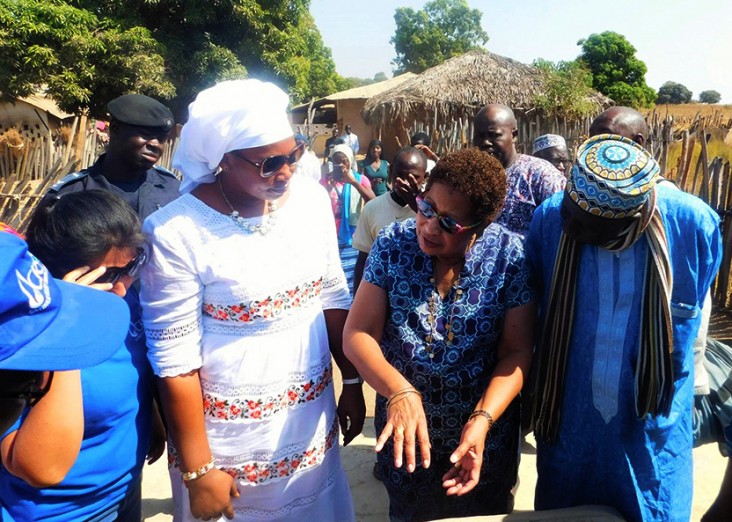Speeches Shim

USAID supports activities in The Gambia that promote regional integration and development. While there is no USAID mission in The Gambia, USAID works with regional economic communities (RECS) and other regional organizations, in addition to a range of private sector and civil society partners, to address transnational development issues. USAID activities in the region that impact The Gambia focus on economic growth, health, youth empowerment, energy and peace and governance.
AGRICULTURE AND FOOD SECURITY
USAID has a long-standing working relationship with the West and Central African Council for Agricultural Research and Development. The Council works in 23 countries (including The Gambia) to coordinate research and development activities in West and Central Africa. USAID partners with the Council to strengthen institutions, scale up technology, and increase the production and availability of quality agricultural seeds and fertilizer.
USAID is helping The Gambia implement the Economic Community of West African States (ECOWAS) fertilizer regulations. USAID also supports the creation of a competitive, inclusive, private sector-led regional fertilizer market. The Gambia also participates in a USAID-supported regional fertilizer stakeholder forum that aims to increase the private supply of appropriate and affordable fertilizers, and help develop private-public partnerships to stimulate demand for fertilizer.
Through USAID’s support for the Permanent Inter-State Committee for Drought Control in the Sahel (CILSS), researchers and members of the seed committee in The Gambia were trained in registering plant species and in managing databases. The Gambia also receives support for their participation in the Food Security Early Warning System.
Finally, USAID supports The Gambia to implement its National Agriculture Investment Plan, to ensure it is compatible with the continent-wide African Union/New Partnership for Economic Development (NEPAD) Comprehensive African Agriculture Development (CAADP) process.
DEMOCRACY, HUMAN RIGHTS AND GOVERNANCE
The Gambia underwent a significant democratic transition in 2016 and 2017, and USAID is working to rebuild and strengthen democratic norms and institutions resulting from this recent political transition. The newly elected government has shown strong political will to continue to build a system of sustainable democratic governance in the country. The country recently amended key electoral laws in order to level the playing field for political parties and to increase participation of marginalized groups in the electoral process. USAID is helping The Gambia lay the foundation for competitive, democratic and responsive political parties that improve the country’s electoral and political processes. USAID’s activities support the electoral cycle through constitutional, legal and regulatory reform, as well as increase the capability and performance of the Independent Electoral Commission.
EDUCATION
Gambian youth participate in the Young African Leaders Initiative (YALI), a US-Government initiative that supports young people to drive growth and prosperity, strengthen democratic governance, and enhance peace and security across Africa.
The YALI Regional Leadership Center (RLC), located in Accra, Ghana, offers interactive and experiential training to participants from nine West African countries: Ghana, Nigeria, Liberia, Sierra Leone, The Gambia, Côte d’Ivoire, Burkina Faso, Cameroon, and Togo. The program has three tracks of study: Business & Entrepreneurship, Civic Leadership, and Public Management. The RLC is run as a public-private partnership, with the MasterCard Foundation, Microsoft, Ecobank, and others. As of August 2018, 131 young Gambian leaders had participated in training courses in Accra.
GLOBAL HEALTH
USAID’s supports The Gambia’s health financing/universal health coverage process. USAID and other donors recently conducted an assessment of the current state of the country’s health system components in order to help The Gambia develop and implement policy recommendations and to spur greater investment by the government and its partners.
USAID is also helping to ensure that the Ministry of Health has access to quality data from districts around the country. USAID trained district-level data managers on data collection, and provided technical assistance to the Ministry of Health to improve and increase initiatives for reducing maternal and child mortality.
POWER AFRICA
USAID’s Power Africa is supporting the West African Power Pool and the ECOWAS Regional Electricity Regulatory Authority in their development of a regional electricity market by 2020. Through this collaboration, national utility companies, including NAWEC of Gambia, and the national regulatory authorities are working to adopt the regional market concept in order to provide their customers access to affordable and reliable electricity. The adoption of a regional electricity market system will facilitate the trading of electricity among all the ECOWAS member countries in an efficient and cost effective way.


Comment
Make a general inquiry or suggest an improvement.